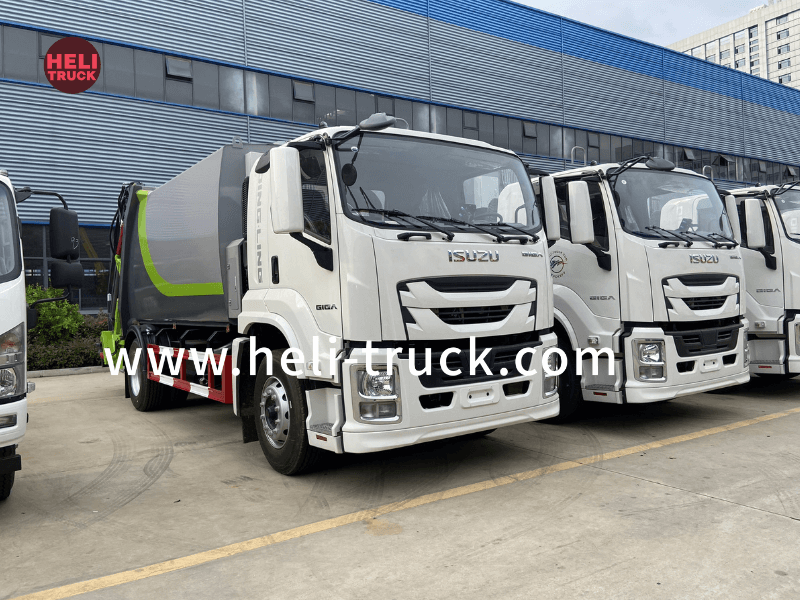Introduction:
Waste management is a critical aspect of urban living, and the efficient collection and disposal of waste are essential for maintaining cleanliness and hygiene in cities and towns. Garbage compactor trucks play a crucial role in this process by collecting, compacting, and transporting waste to disposal sites. In recent years, there has been a growing demand for garbage compactor trucks with high reliability to ensure uninterrupted waste collection services. This article explores the importance of high-reliability garbage compactor trucks in enhancing waste management efficiency and discusses the key features and technologies that contribute to their reliability.
The Need for High-Reliability Garbage Compactor Trucks:
Garbage collection is a time-sensitive and essential service in urban areas, and any interruptions or delays in waste collection can lead to environmental and public health hazards. Therefore, it is crucial to have garbage compactor trucks that are reliable and can operate efficiently under various conditions. High-reliability garbage compactor trucks are designed to withstand the rigors of daily waste collection operations and deliver consistent performance to ensure uninterrupted service to communities.
Key Features of High-Reliability Garbage Compactor Trucks:
1. Robust Construction: High-reliability garbage compactor trucks are built with durable materials and components that can withstand the heavy loads and harsh operating conditions encountered during waste collection. The chassis, body, and compaction mechanism of these trucks are designed to be sturdy and long-lasting to ensure reliable performance over the truck's lifespan.
2. Advanced Compaction Technology: High-reliability garbage compactor trucks are equipped with advanced compaction technology that allows them to compact waste efficiently and maximize the truck's carrying capacity. This not only reduces the number of trips required for waste collection but also minimizes fuel consumption and operational costs.
3. Reliable Hydraulic System: The hydraulic system is a critical component of garbage compactor trucks, as it powers the compaction mechanism and other functions of the truck. High-reliability garbage compactor trucks are equipped with robust hydraulic systems that are designed for continuous use and can withstand the demands of heavy-duty waste collection operations.
4. Enhanced Safety Features: Safety is a top priority in waste management operations, and high-reliability garbage compactor trucks are equipped with enhanced safety features to protect both the operators and the public. These trucks may have features such as rear-view cameras, proximity sensors, and emergency stop systems to prevent accidents and ensure safe operation.
5. Efficient Maintenance and Serviceability: To ensure high reliability, garbage compactor trucks need to be maintained regularly and serviced promptly. High-reliability trucks are designed for easy maintenance and serviceability, with accessible components and user-friendly interfaces that allow operators to perform routine maintenance tasks quickly and efficiently.

Technological Advancements in High-Reliability Garbage Compactor Trucks:
1. Telematics and IoT Integration: Telematics and Internet of Things (IoT) technology are being increasingly integrated into garbage compactor trucks to provide real-time monitoring and management of the vehicles. Telematics systems can track the truck's location, performance metrics, and maintenance needs, allowing fleet managers to optimize operations and schedule maintenance proactively.
2. Automated Route Optimization: High-reliability garbage compactor trucks may be equipped with automated route optimization software that can calculate the most efficient collection routes based on factors such as waste volume, traffic conditions, and disposal site locations. This technology helps reduce fuel consumption, minimize travel time, and improve overall operational efficiency.
3. Remote Diagnostics and Maintenance Alerts: Remote diagnostics systems enable garbage compactor trucks to communicate maintenance needs and issues to fleet managers in real-time. These alerts can help prevent breakdowns, reduce downtime, and extend the lifespan of the trucks by addressing maintenance issues promptly.
4. Energy-Efficient Powertrains: With a growing focus on sustainability and environmental conservation, high-reliability garbage compactor trucks are increasingly being equipped with energy-efficient powertrains, such as hybrid or electric systems. These powertrains reduce emissions, lower fuel costs, and contribute to a cleaner and greener waste management operation.
Case Studies of High-Reliability Garbage Compactor Trucks:
1. City A: The municipal waste management department of City A invested in a fleet of high-reliability garbage compactor trucks equipped with advanced telematics systems and route optimization software. As a result, the department was able to reduce fuel consumption by 15%, optimize collection routes, and improve overall operational efficiency, leading to cost savings and enhanced service delivery.
2. City B: In response to increasing demand for waste collection services, the waste management department of City B upgraded its fleet with high-reliability garbage compactor trucks featuring energy-efficient powertrains and automated maintenance alerts. These trucks were able to handle the additional workload effectively, reduce maintenance costs, and improve the department's environmental footprint by lowering emissions.
Refuse Compactor Truck :
High-reliability garbage compactor trucks play a vital role in enhancing waste management efficiency and ensuring reliable waste collection services in urban areas. By incorporating robust construction, advanced technologies, and efficient maintenance practices, these trucks can deliver consistent performance, minimize downtime, and optimize operational costs. As cities continue to grow and face new challenges in waste management, investing in high-reliability garbage compactor trucks will be essential to meet the evolving needs of communities and achieve sustainable waste management practices.
